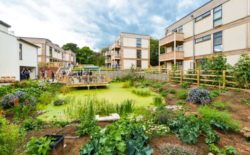Growing a home together: Café Psychologique 20 June
The Psychological and Social Impact of Co-housing
A home of my own: a very current preoccupation and aspiration. So what do you do when the cost of it is beyond reach for many, and the impact of having one seems to create as much isolation and separation as the security it is supposed to provide?
Abraham Maslow identified in the 1940s that shelter is as basic a human need as air, food, water and clothing. However, the idea of individualised dwellings built around nuclear families is only one, relatively recent and fairly westernised version of achieving this. People involved in co-housing argue that it is a cheaper, more environmentally sustainable, more enjoyable and more secure a way of achieving more than just shelter. They also suggest that in seeing housing as an investment opportunity we are losing sight of its primary function of shelter, and the wisdom gained through long human experience that building houses into communities provides a more secure basis for societies.
Co-housing, as a model for this, began in Denmark in 1972 and today about 50,000 people live in co-housing in Denmark. Its popularity spread rapidly across Europe and is now emerging worldwide. Leeds is home to several co-housing projects and a new one is well underway in Chapeltown. We are fortunate to welcome Liz Lewis and Lara Eggleton from the well established Lilac project, and Pete Richardson, one of the founders of Chapeltown Co-Housing (ChaCo).
They will introduce this Café Psychologique on Tuesday 20 June 8.00 pm to 9.45 pm in Seven Arts, Chapel Allerton, Leeds. The Café costs £4 on the door.
There is a poster to download here:
Café Psychologique June 2017
You can join in the conversation online on our Facebook page: Café Psychologique
You can read the Café Rules here: Café Psychologique Rules
